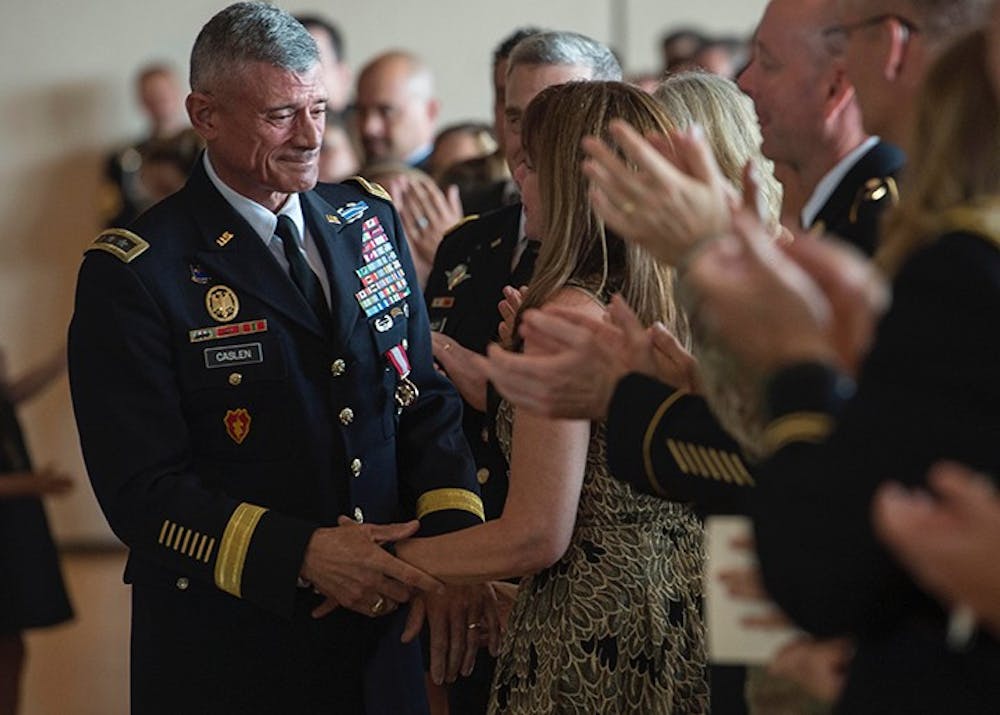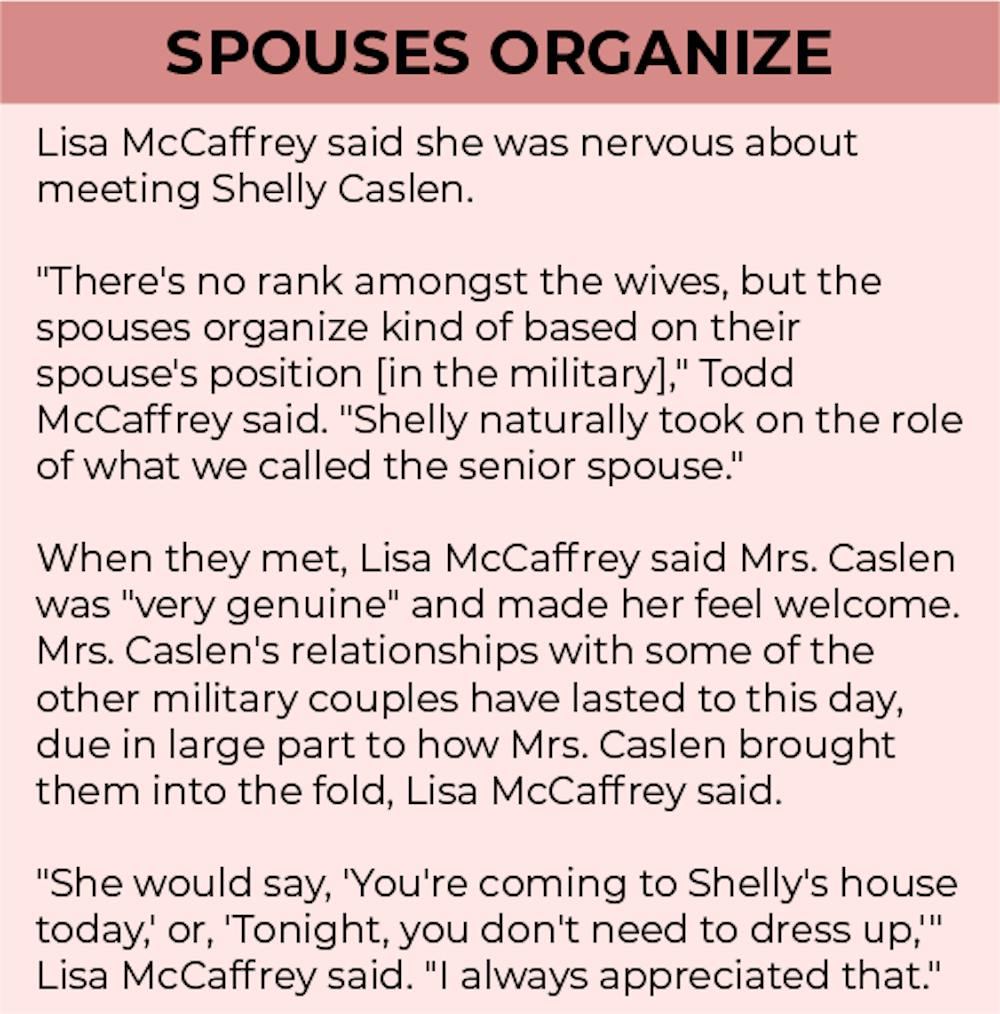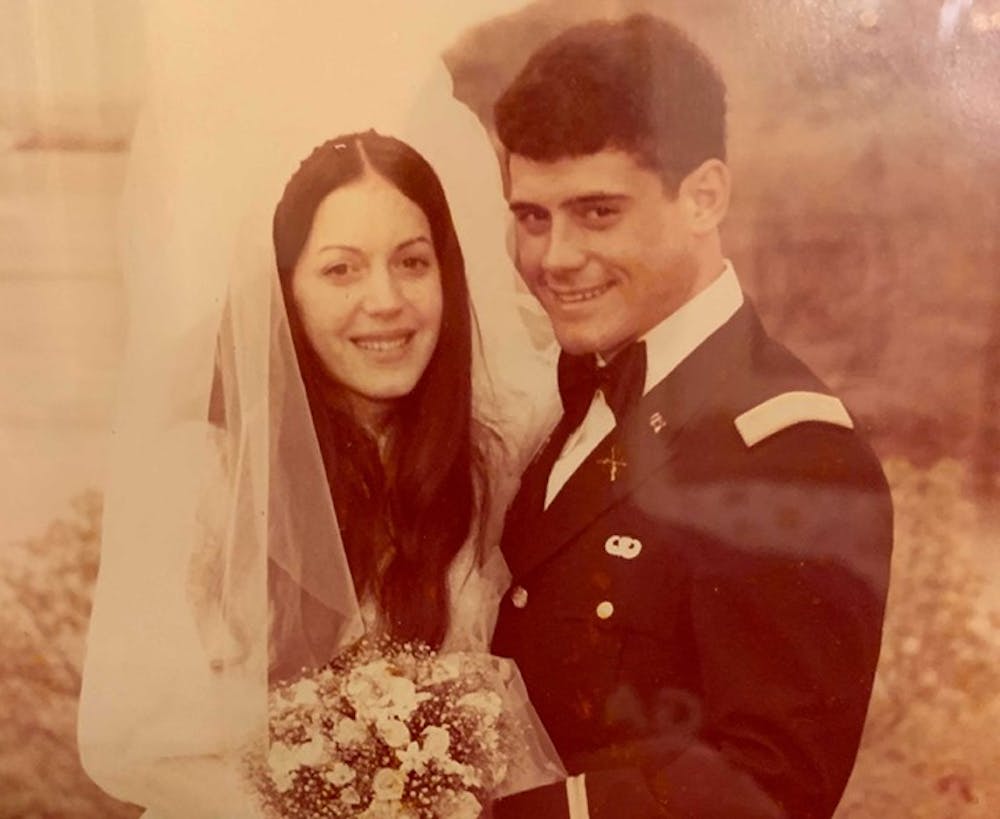USC’s president and first lady had an expiration date attached to their relationship when they first met. Six months.
At the time, President Bob Caslen was a fresh West Point graduate with the class of 1975, invited to work at his alma mater for six months as a graduate assistant.

He remembers his first visit to the West Point football office well. Sitting at the front desk was one “sharp and attractive” secretary: Shelly Pastin, the future Mrs. Caslen. He left a good first impression.
“I told the other secretary to stay away from him,” Mrs. Caslen said.
The two went on some dates, but, inevitably, the time came to say goodbye. Then it was off to military training over a thousand miles away.
“My friends, when he left, said, ‘You might as well forget him. You'll never see him again,” Mrs. Caslen said.
Of course, that wasn't the end. They spent money on long-distance phone calls. He wrote her letters during training. She even made an expensive flight out to visit him. He wasn't sure where it would go.
“But I found out I started missing her," President Caslen said.

When Mrs. Caslen came to visit another time, he popped the question. Next came the wedding.
“Do you remember what day?” Mrs. Caslen asked her husband.
“April 16, 1977,” he said.
In the 43 years that followed, the couple has had three children and five grandchildren. They've also made it through war together. Life wasn’t always easy.
In total, roughly seven years were spent away from his family, President Caslen said. Most of that time was under “very tough circumstances,” which added to the stress of his loved ones back home.
"I think there's a lot of crying behind the door, of missing him and just worried for him, but [my mom] never really let that show," their youngest son, Jeff Caslen, said. "She knew that if she showed that she was scared, then we would get scared."
Thirty years ago, President Caslen was preparing to deploy to Iraq for a “hugely high-risk mission” — the beginnings of the Gulf War. Soldiers lined up for phone calls, each allotted two minutes to speak to their loved ones. In his mind, he said, this might be his last conversation with his wife.
As their call came to an end, Mrs. Caslen passed the phone to one of their sons.
“He says, ‘Daddy, I don't want you to die,’” President Caslen said. “And then the two minutes was over, and they cut me off.”
It wasn’t unusual for Army spouses to lose their loved ones. At times, they were holding four memorials per week, by Mrs. Caslen’s estimates. The wives leaned on each other for consolation.

“It was a job,” Mrs. Caslen said. “But we felt that the more we could be independent and handle it at home … the guys that were fighting the war, they could fight it knowing that we were OK taking care of the other families.”
President Caslen wrote her letters every night from the middle of the Saudi Arabian desert. For about a six month period, he chronicled the process of war preparation and outbreak.
"I still have every single letter," Mrs. Caslen said. "I have them tucked away in a purse."
Despite all their time apart, the Caslens agree the physical distance has only brought them closer in their relationship.
When he's home, President Caslen said, he wants to be present.
"There's going to be times when you have to go to war, but not all the time," President Caslen said. "And when it's not all the time, you need to get home. And you need to sit down and have a conversation with your kids and have a conversation with your family, with your wife."
President Caslen only needs to speak about 1,000 words a day, but Mrs. Caslen has a greater need for conversation. By the time he came home from work, he was ready to relax with a newspaper and a cup of coffee. But after being home with the children all day, Mrs. Caslen still needed someone to talk to. President Caslen said he knew he needed to prioritize her needs for conversation over his needs for relaxation.
So he would come home and listen. He still does.
“He talks about it kind of jokingly, but the reality is, that's important,” Todd McCaffrey, a friend of the Caslens, said. “I think it provides great insight into what makes their marriage really work.”
Todd McCaffrey and his wife, Lisa, have known the Caslens for nearly 30 years. The husbands were in the military together, and the wives grew close at home.

Today, McCaffrey is once again working under President Caslen as USC’s director of military affairs. There are parallels between the Caslens' time in the military and now in USC. McCaffrey said in the military, President Caslen received "external affirmations" and visual symbols of success, but Mrs. Caslen liked to stay behind the scenes. The same can be said of the Caslens today.
Mrs. Caslen much prefers entertaining guests at the house to giving speeches in public, she said. It “can get hard” being a public figure.
“I would rather go in and just mingle and not have them know who I am,” Mrs. Caslen said. “I'm not the commander, or the [superintendent], or the president, you know; that's his job. I'm there to support him and do what I need to do.”
Mrs. Caslen married her best friend 43 years ago, she said, and he remains her go-to person today. For them, a successful marriage all boils down to trust.
Trust, and unconditional love.
“When she knows that I love her unconditionally — and it's not tied to her performance, it’s not tied to something she has to do, it’s not tied to anything — it doesn't even matter. Unconditional love gives you a sense of trust,” President Caslen said. “And that's how our relationship has really grown and thrived over these last 43 years.”
Correction (Feb. 12, 2021, at 10:49 a.m.): A previous version of this article misstated the number of grandchildren the Caslens have.

